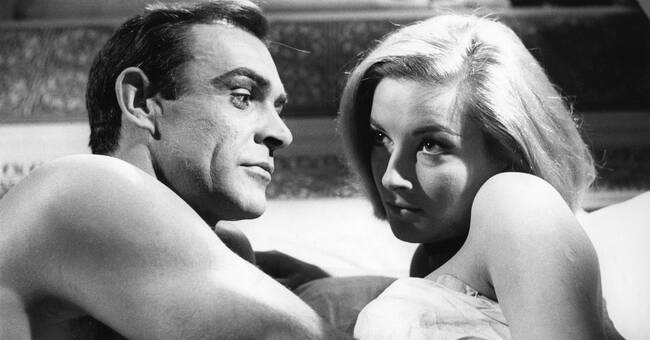I probably said the line myself, probably after watching Steve Coogan and Rob Brydon lovingly imitate Sean Connery's Scottish English in The Trip.
Because Sean Connery made the role iconic.
He gave the spy a confident indifference and with small means - the raised eyebrow, the crooked smile - he suggested a game without rules of the game, in the service and between the sheets.
Ian Fleming is said to have been so impressed that he gave Bond a Scottish background, modeled on Connery's own.
James Bond came at a time when Britain's film culture was moving towards the socially critical and socially conscious.
In the spy genre, as in John Le Carré and the films about Harry Palmer, there was a critique of the country's weakened position in world politics.
Bond said instead that Britain was a force to be reckoned with, but under the radar.
His Edinburgh dialect was an antidote to the snobbish upper-class English associated with power, classical acting and general bullying.
Connery himself came from a simple background.
His first job was as a milkman.
As a sixteen-year-old, he enlisted in the Navy and acquired two tattoos - "Scotland Forever" and "Mum and Dad".
Promising football player
At the age of eighteen he started bodybuilding and was a good football player - in fact he was offered a contract with Manchester United but chose acting instead.
That he was a fighter is not unimportant.
Because even if Connery, like Bond, wears a tuxedo and can behave in nicer salons, there is always a bit of the working class there, not least in body language and violent capital.
Something Alfred Hitchcock skilfully used in "Marnie" (1964), where sexiness slips into the psychotic.
Director Sidney Lumet did the same in "The Hill" (1965), where Connery's character ends up in brutal, sadistic punitive situations.
Over the years, Connery got tired of Bond, he could never shake him off.
In fact, he could get upset when people shouted at him in the street and he has said in interviews that he wanted to "kill Bond".
You can understand that.
Did he ever see the imitations as flattering, or just as an ever-elusive one?
"Is there a dark link between Bond and Connery"
There's a dark link between Bond and Connery.
Ex-wife Diane Cilento has testified that he could be a cruel husband.
In a notorious TV interview from 1987, he explains that sometimes you have to use force to get your will through, also within the family.
Has the promotion of violence made him a better or worse Bond?
He was voted the best James Bond ever as late as 2020 in the UK.
It was not until the 1980s that Connery managed to step out of Bond's shadow (despite a reprise in "Never Say Never Again", 1983) to instead perform some of his finest roles: as the Franciscan monk William of Baskerville in "In the Name of the Rose" (1986 ) and the tough cop Jimmy Malone, who chases Al Capone, in "The Immutables" (1987).
The role earned him an Oscar.
Personally, I will remember him best as the aged Robin Hood in "Robin Hood - The Man of Adventure" (1976).
A love story with depth, maturity and tenderness - unlike James Bond.
There, Sean Connery is so lovable and with the line "The day is ours, Robin, you used to say, and then it was tomorrow" I mourn him.

